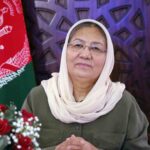✍️ By: Hamia Naderi
In Afghanistan’s turbulent history, the word revolution has almost always conjured up the image of men. Rarely has an Afghan woman been envisioned as a revolutionary. But one name broke that mold: Meena Keshwar Kamal, founder and leader of the Revolutionary Association of the Women of Afghanistan (RAWA).
Born in Kabul in 1956, Meena studied at Malalai High School and then at the Faculty of Islamic Law at Kabul University. At just 20, she founded RAWA in 1977 — Afghanistan’s first independent women’s political organization — with the aim of fighting for women’s rights and a secular democracy.
Under her leadership, RAWA combined political activism with cultural work. In 1980, she and her colleagues launched the magazine Payam-e-Zan (“Women’s Message”), where Meena wrote critical articles, distributed pamphlets, and organized protests against the Soviet invasion and the ruling Khalq and Parcham parties.
Unlike many of her male peers at the university who leaned toward Islamist movements, Meena chose a leftist path and organized women against both Soviet occupation and Islamic fundamentalism, which she argued were two sides of the same oppression. RAWA’s website notes that she often traveled alone to Kabul and other key cities to mobilize women.
In a recorded speech, Meena describes how Afghan women and men resisted Soviet tanks, bombings, and chemical attacks, citing student strikes and urban uprisings in 1980–81 as examples of popular resistance.
In 1981, she visited France at the invitation of the Socialist Party and toured other European countries, receiving warm support — even prompting a Soviet delegate to walk out of a meeting in protest.
Facing growing threats, Meena relocated part of RAWA’s activities to Pakistan, where she established schools, a hospital, and nursing workshops for Afghan refugee women and children.
On February 4, 1987, she and two colleagues were assassinated in Quetta, allegedly by agents of the Afghan intelligence service (KhAD) and Gulbuddin Hekmatyar’s party. In 2002, the BBC reported that Pakistan executed two Afghan men for their role in her killing.
In 2006, Time magazine named Meena among “60 Asian Heroes,” writing:
“Though she was only 30 at the time of her death, Meena had planted the seeds of an Afghan women’s movement on the strength of her intellect.”
After her death, RAWA’s activities continued — albeit under more difficult conditions — through the Mujahideen era and Taliban’s first regime. Its members operated underground, educating women in secret and documenting Taliban atrocities, including the infamous 1999 stadium execution of a woman named Zarmeena, which they captured on video.
Today, RAWA remains active, publishing statements and Payam-e-Zan online and advocating for women’s rights in Afghanistan under increasingly repressive conditions.
Meena’s life and legacy endure as a symbol of defiance and hope — the story of the first Afghan woman to lead a revolutionary movement for justice.





